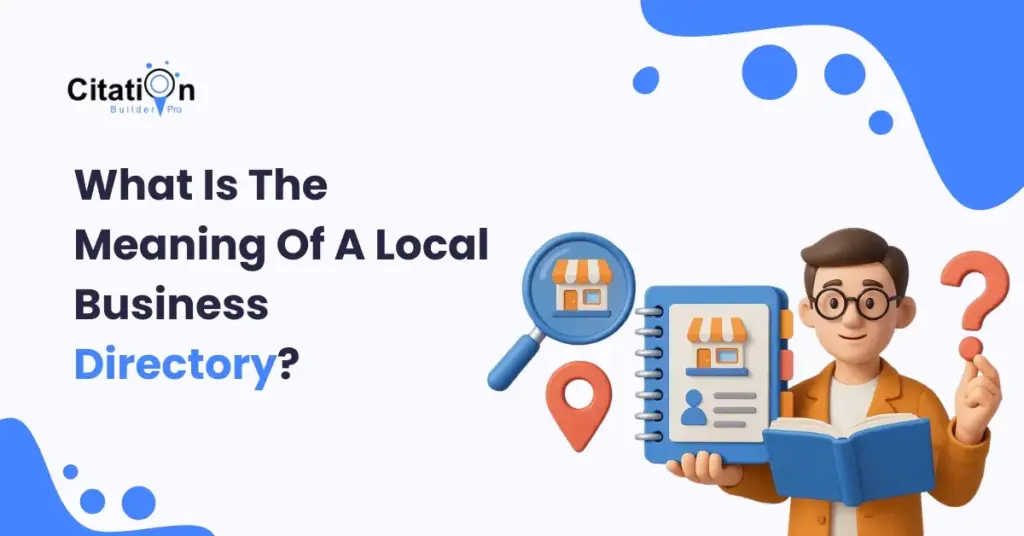In today’s digitally connected world, local business visibility isn’t just about having a physical storefront it’s about showing up where your customers are searching. Whether it’s Google, Yelp, or niche-specific platforms, your business needs to appear in the right places. That’s where local business directories come into play.
This guide will unpack everything you need to know about local business directories: what they are, why they matter, how to leverage them, advanced SEO strategies, real-life examples, and how you can turn listings into a lead-generation powerhouse.
If you want to dominate local search results and establish your brand’s credibility online, keep reading. This is your blueprint.
Table Of Contents
What Is a Local Business Directory?
A local business directory is an online database that lists businesses within specific locations and industries. It’s designed to help consumers find relevant, nearby services or products.
These directories present details such as:
Business Name
Address
Phone Number
Website
Email Address
Categories or Services Offered
Reviews and Ratings
Images and Videos
Business Hours
Social Media Links
Most directories also allow customers to interact leaving positive reviews, posting questions, or sharing experiences which adds another layer of engagement and trust.
Why Directories Exist
Local directories emerged from the need to digitize the traditional phonebook. As local search behavior evolved, search engines like Google began to prioritize directory signals in their algorithms. Today, accurate and optimized directory listings are essential for local SEO.
General Directories: Google Business Profile, Yelp, Bing Places, Apple Maps
Niche Directories: Healthgrades (healthcare), Avvo (legal), Houzz (home design), TripAdvisor (travel)
Industry Association Listings: Local Chamber of Commerce, BBB
Aggregator Networks: Data aggregators like Foursquare, Data Axle, Neustar Localeze distribute business info to multiple directories.
Types of Local Business Directories

An online business directory often takes two forms; General multiple niche directories and Specific niche directories. The General multiple niche directories are not specific to any niche. It includes listings from a variety of business categories, for example, Google My Business. On the other hand, the specific niche directory is meant to cater to just a few business types in specific niches or industries, for example, the B2B business directories such as Business Network.
So, when do you go for the General multiple niche directories? Well, that will depend on your business type. But, I would advise you to for it when your main focus is to create huge traffic on your site. People always start by searching for a business online on General multiple niche directories such as Google My Business. Therefore, your business is likely to rank highly on search results when you opt for General multiple niche directories due to their size and reputation. However, if you want to lay claim to better expertise, then you should go for the specific Specific niche directories since they focus on specific areas or industries. You will be able to provide information pertinent to your business under this category, something that is not recommended in the General multiple niche directories. Overall, go for the specific niche directories if you are concerned with the status and reputation of your business since people often have faith in specific niche directories.
As much as the General multiple niche directories might enjoy more traffic overall compared to Specific niche directories, the quality of the traffic is better for the Specific niche directories. This is because most online users who search on specific niche directories tend to have specific needs and are more likely to make a purchase. Therefore, the conversion rate for specific niche directories is often higher despite experiencing less traffic.
It is difficult to determine which of the two will provide you with better results because the business needs tend to vary depending on the business need, business type, and the overall behavior of the customers in a particular industry. I would recommend that you take advantage of both local business directories. That is, ensure that your business is listed on big directories, and also in a few specific niche directories.
The Role of Local Business Directories in Local SEO

Search engines use hundreds of signals to determine which business should appear in local search results. Business directories contribute significantly to the following key ranking factors:
1. NAP Consistency (Name, Address, Phone Number)
Google cross-checks your business’s name, address, and phone number across multiple sources. NAP Consistency across the web boosts your trustworthiness in Google’s eyes.
2. Citation Authority
Mentions of your business (with or without a link) on authoritative websites act as citations. The more high-quality citations you have, the more credibility you build.
3. Local Backlinks
Many directories offer a backlink to your website. High-quality backlinks from established directories contribute to domain authority.
4. Engagement Signals
Reviews, clicks, call-to-actions, and check-ins from directory listings signal user engagement and brand relevance.
5. User Experience & Trust
Listings that are accurate, rich with content, and updated regularly build user trust. This indirectly supports your SEO by improving time-on-site and reducing bounce rates.
Real-World Examples of Powerful Local Business Directories
Let’s explore the most valuable directories for both general and niche categories:
| Directory | Primary Use Case | Notable Features |
|---|---|---|
| Google Business Profile | General business visibility | Connects with Maps & Search, supports posts, insights |
| Yelp | Local services & restaurants | Reviews, messaging, photos, deals |
| TripAdvisor | Travel, hospitality, tourism | Ranking algorithms, traveler reviews |
| Apple Maps | Navigation, iOS default | Integrates with Siri, CarPlay |
| Bing Places | Windows and Bing search users | Simple setup, sync with Yelp |
| Facebook Business | Community engagement | Messenger integration, user reviews |
| Houzz | Home improvement professionals | Portfolio display, project showcase |
| Avvo | Legal professionals | Lawyer reviews, disciplinary info |
| Healthgrades | Healthcare providers | Ratings, appointment scheduling |
| Better Business Bureau (BBB) | Consumer trust & accreditation | Trust badge, dispute resolution |
Each directory serves a unique demographic and search behavior. Getting listed across both broad and niche directories ensures you cover all discovery touchpoints.
Benefits of Being Listed in Local Business Directories
Improved Search Visibility
Google often pulls directory listings into local packs, map packs, and featured snippets. Listings also appear in voice search results.
Increased Website Traffic
Many directories drive direct referral traffic to your website, especially when listings are complete and include compelling CTAs.
More Leads & Phone Calls
Up to 70% of mobile searchers call a business directly from search results or directory listings.
Enhanced Brand Credibility
Customers trust businesses with complete, positive online profiles.
Control Over Your Digital Presence
Claiming and optimizing your listings lets you manage what people see about your brand.
How to Optimize Your Listings for Maximum Impact
1. Claim Your Listings Across All Relevant Directories
Start with high-authority platforms: Google, Yelp, Bing, Facebook, Apple Maps.
2. Use Consistent NAP Data
Ensure that your NAP (Name, Address, and phone range) are identical across every listing.
3. Write Keyword-Rich Business Descriptions
Include your location and service keywords naturally in your business bio.
4. Choose Accurate Business Categories
Use primary and secondary categories that reflect your services.
5. Upload High-Resolution Images
Photos of your storefront, products, staff, or projects increase click-through rates.
6. Collect and Respond to Reviews
Positive reviews boost your reputation and influence rankings. Always respond to reviews positive or negative.
7. Add Attributes, Services & FAQs
Many platforms allow detailed attributes (e.g., “Wheelchair Accessible”) and FAQs. Fill them out fully.
8. Use UTM Parameters to Track Performance
Track traffic from directories using Google Analytics.
Advanced SEO Tips for Local Directories
Add Schema Markup to Your Website
Use LocalBusiness schema to provide structured data that enhances your local relevance.
Build Links from Industry Associations
Get listed on Chamber of Commerce sites, local newspapers, and professional organizations.
Monitor with Local SEO Tools
Platforms like GMB Briefcase, BrightLocal, Whitespark, and Yext can help manage, audit, and optimize directory performance.
Sync with Google Business Profile
Regularly gbp post updates, reply to reviews, and monitor insights.
Common Pitfalls to Avoid
Inconsistent Listings: Slight variations in name or address confuse Google and reduce trust.
Set-and-Forget Listings: Failing to update holiday hours, new services, or images can result in missed opportunities.
Fake Reviews: These are detectable by algorithms and can lead to penalties.
Duplicate Listings: Create confusion and dilute SEO equity.
Final Thoughts
A well-optimized local directory presence is more than just a listing it’s a foundation for trust, visibility, and growth.
Directories act as an extension of your brand. When optimized correctly, they:
Boost your rankings in local search
Drive targeted traffic
Increase phone calls and form submissions
Reinforce brand credibility through reviews and visibility
If you’re serious about expanding your local reach, it’s time to invest in your directory strategy.
Frequently Asked Questions (FAQs)
Q1: How many directories should I list on?
Ans: At minimum, focus on 10–15 high-authority general and niche directories. More is better, as long as data is consistent.
Q2: Do paid directory listings work?
Ans: Premium options on platforms like Yelp or niche directories can improve visibility, but ROI depends on industry and location.
Q3: Can I rank locally without directories?
Ans: Unlikely. Directories contribute significantly to local rankings and consumer trust. Skipping them limits your reach.
Q4: How often should I audit my listings?
Ans: Quarterly is a good rule of thumb. Monitor reviews and update info as needed.
Level Up Your Local SEO Game
Whether you’re looking to build powerful citations or audit your current listings, CitationBuilderPro has the tools and expertise to get you to the top of local search.
How useful was this post?
Average rating 5 / 5. Votes: 2
No votes so far! Be the first to rate this post.

I am the founder of Citation Builder Pro. I have been in the SEO and content marketing industry for 15 years and have a lot of experience in public relations and online marketing.
I started Citation Builder Bro to help businesses of all sizes create high-quality citations for their websites. My team and I are dedicated to providing our clients with the best possible services.




